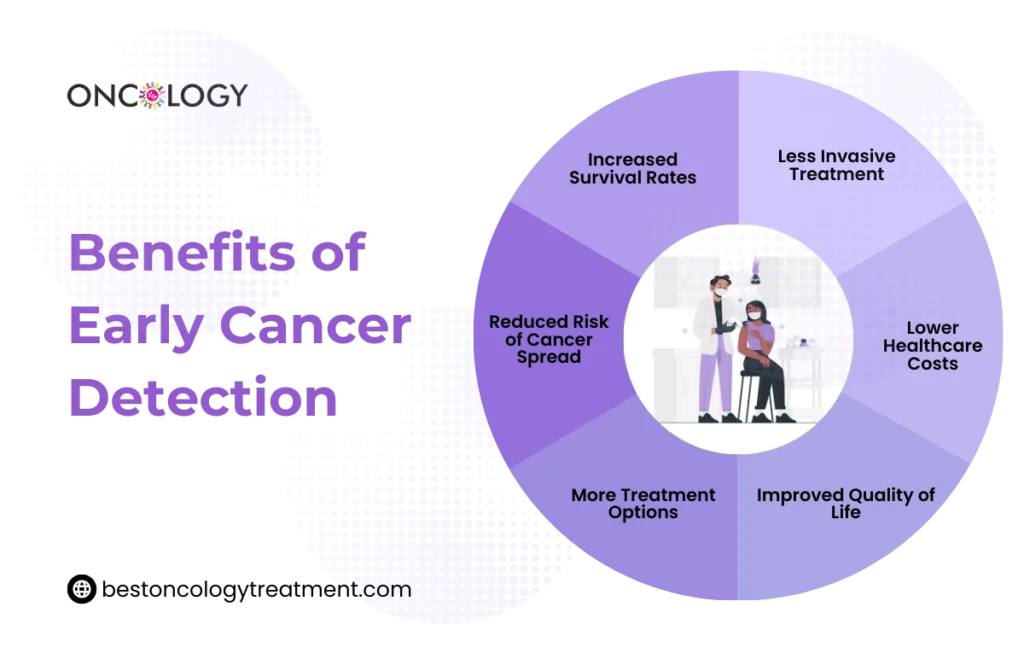Cancer is a leading cause of death worldwide. Still, with advancements in medicine, cancer screening tests have become a critical tool in detecting cancer at its earliest stages, when it’s most treatable. The earlier the cancer is detected, the better the chances of successful treatment. In this blog, we’ll explore the importance of cancer screening, the various types of tests available, and how they can help both men and women in early cancer detection test.
Why Are Cancer Screening Tests Crucial?
Cancer screening tests are medical procedures designed to detect cancer in its early stages. These tests are conducted on individuals who may not have any symptoms, allowing for earlier intervention. There are various types of cancer screening tests, each aimed at detecting specific types of cancer. The choice of screening test depends on factors such as age, gender, family history, and lifestyle.
Every year, millions of lives are affected by cancer. Often, cancer goes unnoticed until it has progressed to more advanced stages. This is where early cancer detection test come in, offering a proactive way to identify the disease before symptoms even appear.
But why should you be concerned about cancer screening tests?
- Silent Progression: Many cancers, like breast, colon, and prostate, develop without early warning signs.
- Improved Outcomes: Cancers caught in the early stages are easier to treat and have higher survival rates.
- Prevention: In some cases, screening tests can detect precancerous conditions, allowing for early intervention before cancer develops.
Cancer screening is not only about saving lives but also about ensuring peace of mind. Regular testing empowers individuals to take control of their health.

Types of Cancer Screening Tests
There are various types of cancer screening tests designed to detect specific cancers based on symptoms, risk factors, or age. These tests play a crucial role in early diagnosis and treatment success.
Common Types of Cancer Screening Tests
Imaging Tests:
- Mammograms: Detect early signs of breast cancer.
- CT Scans: Used for lung and abdominal cancers.
Cancer Screening Blood Test:
- PSA Test: Identifies prostate cancer markers.
- CA-125 Test: Helps in detecting ovarian cancer.
- AFP Test: Indicates liver cancer or other abnormalities.
Endoscopic Tests:
- Colonoscopy: Screens for colorectal cancer.
- Bronchoscopy: Detects abnormalities in the lungs.
Physical Exams:
- Skin Checks: Identifies potential skin cancer.
- Clinical Breast Exams: Detect lumps or changes in breast tissue.
Genetic Testing:
- Screens for mutations like BRCA1 and BRCA2, linked to breast and ovarian cancers.
Best cancer screening tests combine these methods to offer a comprehensive approach based on individual health needs.
Risk Factors That Affect Screening Recommendations
Screening recommendations depend on personal health profiles and risk factors. Here’s what you need to know
Key Risk Factors:
- Age:
- Breast cancer screenings are typically recommended after age 40.
- Colonoscopies often start at age 50.
- Family History:
- A family history of cancer increases the likelihood of developing similar conditions.
- Genetic testing may be advised to assess inherited risks.
- Lifestyle Habits:
- Smoking significantly raises the risk of lung cancer, making low-dose CT scans essential.
- Unhealthy diets and sedentary lifestyles are linked to colorectal and other cancers.
- Medical History:
- A history of chronic illnesses like diabetes or obesity may influence screening schedules.
- Previous cancer diagnoses necessitate ongoing monitoring through the best cancer screening tests.
Tailored Recommendations Based on Risk:
- Individuals with high-risk profiles might need screenings earlier and more frequently.
- For general populations, annual or biennial screenings are often adequate.
- Speak to your doctor about the right cancer screening blood test and other tools to identify risks effectively.
Importance of Early Cancer Detection Tests
An early cancer detection test can be a life-saving tool. When cancer is detected early, it can be treated more effectively, often with less aggressive therapies. In many cases, the disease may be cured if caught at an early stage. Regular cancer screening blood tests, imaging tests, and other screenings ensure that any signs of cancer are caught as early as possible.
Common of Cancer Screening Tests:
When it comes to cancer screening tests, there are various methods available based on the type of cancer, risk factors, and personal medical history. Let’s break down the most commonly used screening tests.
- Mammogram for Breast Cancer: A mammogram is the go-to test for detecting breast cancer in women. It uses low-dose X-rays to detect abnormal growths in breast tissue. Regular mammograms, especially for women over 40, are crucial for early breast cancer detection.
- Colonoscopy for Colorectal Cancer: A colonoscopy is a visual examination of the colon, used primarily to detect colon cancer. During this test, polyps (small growths that may become cancerous) can also be removed before they develop into cancer.
- Pap Smear and HPV Test for Cervical Cancer: These tests are crucial for early detection of cervical cancer. A Pap smear looks for precancerous or cancerous cells on the cervix, while the HPV test checks for the virus that can lead to cervical cancer.
- Cancer Screening Blood Tests: Blood tests are becoming increasingly valuable in detecting cancer markers, which are substances produced by cancer cells or by the body in response to cancer. For example: Prostate-specific Antigen (PSA) test, CA-125 blood test, Alpha-fetoprotein (AFP).
- Cancer Screening Tests for Males: For men, prostate cancer is a significant concern. Alongside the PSA test, men should also consider lung cancer screening tests for males if they have a history of heavy smoking. Early detection can make all the difference in treatment outcomes.
- Cancer Screening Tests for Females: Women should prioritize regular mammograms and Pap smears but also discuss ovarian and lung cancer screenings with their healthcare providers if they have a family history or other risk factors.
Cancer Screening Blood Tests
Cancer screening blood tests can detect certain types of cancer by measuring specific proteins, hormones, or cancer cells circulating in the bloodstream. Some common blood tests include:
- Complete Blood Count (CBC): Often used to detect blood cancers like leukemia.
- Liver Function Tests: These can identify cancers that have spread to the liver.
- Tumor Marker Tests: These tests look for specific proteins produced by cancer cells in certain types of cancer.
Cancer Screening Tests for Males and Females
Screening guidelines may differ between genders due to varying risks for certain cancers. Below are some cancer screening tests for males and females:
- For males: Prostate cancer screening (PSA test), Testicular cancer self-exams.
- For females: Breast cancer screening (Mammograms), Cervical cancer screening (Pap and HPV tests).
How Cancer Screening Can Save Lives
Once you’ve identified the right cancer screening tests, you might wonder about the tangible benefits these screenings can bring. The facts are simple: early cancer detection test is a game-changer.
- Longer Life Expectancy: Early detection increases survival rates across various cancers, including breast, colon, and cervical cancers.
- Less Aggressive Treatment: Detecting cancer in the early stages often means treatment can be less invasive and more effective.
- Peace of Mind: Regular screenings provide reassurance, allowing you to focus on living a healthy life without worrying about undetected illnesses.
Consider the following key facts:
- Breast cancer screening has reduced the mortality rate by nearly 40% since the introduction of mammograms.
- Colorectal cancer screening has saved thousands of lives by detecting precancerous polyps.
- Prostate cancer has a 99% survival rate when detected early through cancer screening blood test like the PSA test.
By making cancer screening a priority, you are making a powerful decision to protect your health and your future.
Take Control of Your Health Today!
So, now that you’re aware of the significance of cancer screening tests, what’s the next step?
- Consult Your Doctor: Schedule a conversation with your healthcare provider to discuss which screening tests are appropriate for you based on your age, gender, family history, and personal risk factors.
- Stay on Schedule: For most people, regular screenings start at age 40. However, if you’re at a higher risk (such as having a family history of cancer), your doctor may recommend starting earlier.
- Advocate for Yourself: If you notice any unusual symptoms, don’t wait. Early testing can be life-saving.
- Share the Importance: Encourage friends and family to stay proactive about their health. Cancer screening can save lives, and your influence can help others make informed decisions.
Taking action now means investing in your future health and well-being. Best cancer screening tests The peace of mind that comes with regular screenings is invaluable.
Conclusion
Cancer screening tests are essential for catching cancer early and improving treatment outcomes. Whether you’re looking for an early cancer detection test or a cancer screening blood test, it’s crucial to consult with your healthcare provider to determine which screenings are appropriate for you. Understanding the importance of cancer screening tests for males and females can guide you toward proactive healthcare decisions that may save your life. Regular screenings and timely interventions offer the best protection against the threat of cancer.



